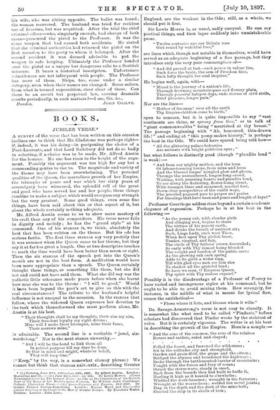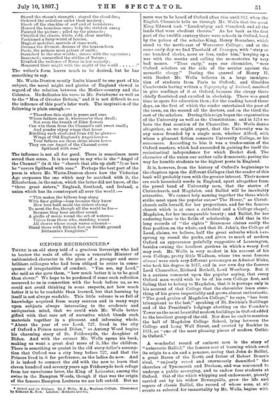BOOKS.
JUBILEE VERSE.* A SURVEY of the verse that has been written on this occasion inclines one to think that Mr. Gladstone was perhaps right— if, indeed, it was his doing—in postponing the choice of a Poet-Laureate, and that Lord Salisbury did not do so badly in selecting, if a choice was to be made, Mr. Alfred Austin for the honour. No one has risen to the height of the argu- ment. Possibly the argument was too high for any but a commanding genius to rise to. The magnitude and variety of the theme may have been overwhelming. The personal qualities of the Queen, the marvellous growth of her Empire, the triumphs of peace and war which her sixty years of sovereignty have witnessed, the splendid roll of the great and good who have served her and her people, these things combine to make a subject which would overpass any strength but the very greatest. Some good things, even some fine things, have been said about this or that aspect of it, but about the whole certainly nothing adequate.
Mr. Alfred Austin seems to us to show more mastery of his craft than any of his competitors. His verse never fails in dignity and melody ; he has the "grand style" at his command. One of his stanzas is, we think, absolutely the best that has been written on the theme. But his ode has serious faults. The first three stanzas say very prettily that it was summer when the Queen came to her throne, but they say it at far too great a length. One or two descriptive touches to mark the time would have been better than seven or eight. Then the six stanzas of the speech put into the Queen's month are not in the best form. A meditation would have been more appropriate than a speech. The Queen certainly thought these things, or something like them, but she did not and could not have said them. What she did say was the pathetic little utterance made years before when she learnt how near she was to the throne : "I will be good." Would it be,ve been beyond the poet's art to give us this with the real circumstances ? The tribute to the husband's helpful influence is not unequal to the occasion. In the stanzas that follow, where the widowed Queen expresses her devotion to , the task which thenceforward she must perform alone, Mr.
Austin is at his best.
"Their thoughts shall be my thoughts, their aim my aim, Their free-lent loyalty my right divine ;
Mine will I make their triumphs, mine their fame, Their sorrows mine,"
is admirable. The second line is a veritable "jewel, six- words-long." Nor is the next stanza unworthy,—
" And I will be the bond to link them all In patriot purpose till my days be done. So that in mind and might, whate'er They still keep One."
(" Keep," by the way, is a somewhat clumsy phrase.) We cannot but think that stanzas xxiv.-xxix., describing Greater
• (I) Victoria. June 20th. 1837—June 20th, 1897. By Alfred Austin. London: Elacmillan and Co.—(2.) June 22nd,1857 an Ode. By Lewis Morris. (Times 2iewspaper.)—(3.) The Longest Rtign: an Ode on the Completion of the Sixtieth Year of the Reign of her Majesty Queen Victoria. By William John Conrthope. Oxford: Clarendon Press.—(4.) Queen-Empress and Empire. 18374827. fly George Francis Swains-Armstrong. London: Marcus Ward and Co.—(5.) Jubilee Greeting at Spithead to the Men of Greater Britain. By Theodore Watts- Canton. London; John Lane.
England, are the weakest in the Ode ; still, as a whole, we should put it first.
Sir Lewis Morris is, as usual, sadly unequal. He can say poetical things, and then lapse suddenly into unmistakeable prose.
"Twelve centuries ago our Britain rose Girt round by watchful foes,"
are lines which, though not notable in themselves, would have served as an adequate beginning of a fine passage, but they introduce only the very poor commonplace of- " And did prevail at last—such power in valour lies, Such force the brain, the arm of Freedom fires, Such lofty thought her soul inspires."
He begins well, again, with-
" Mixed is the journey of a nation's life,
Through frowning mountain-pass and flowery plain, Through peaceful halcyon days, rude storms of civil strife, Brief pleasure, longer pain."
Nor are the lines-
" Mother of freemen ! over all the earth Thy Empire-children come to birth," open to censure, but it is quite impossible to say "vast continents are thine, or sprung from thee," or to talk of "giant commonwealths" being "nourished at thy breast." The passage beginning with "Ah, honoured, thin-drawn life!" and ending at "this pomp makes history," is perhaps the best in the Ode. We could have spared being told how—, " All the glittering palace-balconies
Are animate with bright patrician eyes ; "
but what follows is distinctly good (though "plaudits loud" is weak) :—
"And from our mighty mother, and the hum
Of labour-teeming towns, from mine and loom
And the blurred forges' mingled glow and gloom,
Throngs the unnumbered, league-long crowd, Waiting, with yearning hearts and plaudits loud, To see along the fluttering, flower-hung street, With trumpet blare and measured, martial feet, Down clear perspectives of the sunlit ways, The jewelled pageant pass to prayer and praise For blessings that have been and peace and length of days!"
Professor Courthope seldom rises beyond a certain academic elegance of expression. Perhaps he is at his best in the following :—
" As the young oak, with slender girth
And clinging root, begins to share The virtues of his parent earth, And drinks the breath of ambient air; Such, Liege Lady, such wast Thou.
When first upon Thy girlish brow, Tender, virginal, and fair, The circle of Thy fathers' crown descended; So early with Thy inmost being blended The weight and burden of the public care : As the growing oak each spring Adds to its girth a wider ring,
Till with glad eyes men see him rise
To shadow all the grateful land ; So have we seen, 0 Empress Queen, Thy spirit with Thy realms expand."
Possibly it is the disadvantage of a Professor of Poetry to have varied and incongruous styles at his command, but he ought to be able to avoid mixing them. How strangely, for instance, in the middle of what is meant for lyrical flow, comes the antithetical-
" Flows where it lists, and blesses whom it wills."
Dr. Savage-Armstrong's verse is not easy to classify. It is somewhat like what used to be called "Pindaric," before scholars had discovered that Pindar wrote by the strictest of rules. But it is certainly vigorous. The writer is at his best in describing the growth of the Empire. Here is a sample :— " And the sons of the sea-men, the sons of the reinless Rovers and raiders, ruled and obeyed;
Felled the forest, and furrowed the wilderness ; Set in the solitudes city and stronghold, Garden and grain-ffeld, the grape and the citron ; Bridged the abysses and broadened the highways ; Broke through the battlemented-barrier of mountains; Fought with the forces and fury of ocean; Struck the storm-wave, steady in onset, Back from the bounds they had built to baffle it, Hurling it high as it heaved to o'erwhelm; Wielded the work-hammer; wrought in the furnaces ; Wrought at the weave-loom ; welded the metal joints ; Dug in the depth and the dusk of the mine-hell; Sheeted the ship in its shells of iron ; Stored the steam's strength ; stayed the cloud-fire; Ordered the orderless under their mastery ; Shook off the shackles of serf and of bondslave; Housed the homeless ones ; holp the stricken ones; Painted the picture ; piled up the pinnacle; Chiselled the chaste, white, cold, clear marble; Fashioned a fairy-world of fancies, Magical melodies, marvels of rime-work, Dreams the divinest, dreams of the heaven-born Poets, the princes most potent of earth; Stretched to the star-worlds ; strove with the mysteries ; Reasoned ; unravelled the riddles of Nature ; Rivalled the radience of Rome in her majesty; Measured their might with the might of the world The writer's form leaves much to be desired, but he has something to say.
Mr. Watts-Dunton mostly limits himself to one part of his subject, the naval might and glories of England viewed in regard of the relation between the Mother-country and the Colonies. He dedicates his verse to Mr. Swinburne as well as to the "Men of Greater Britain," and it is not difficult to see the influence of this poet's later work. The inspiration of the following is plain enough :— "Therefore this sight is yours and ours
Whose fathers see it, wheresoe'er they dwell : Not even the breath of Eden flowers Can win them from the Channel's salt sweet smell ; And yonder skyey wings that hover
Kindling each steel-clad titan till he glows—
Wings of Old England's Angel-lover-
Your fathers see them shine above her—
They see our Angel of the Channel cover Spithead with rose."
The influence is not all for good. There is sometimes more sound than sense. It is not easy to say who is the "Angel of the Channel" (is it the "cherub that sits up aloft " ?) or how he "covers Spithead with rose." Perhaps the best part of the poem is where Mr. Watts-Dunton shows how the Victorian Age surpasses the one which may be matched with it, the Elizabethan, in the union, which the latter did not know, of the "three great sisters," England, Scotland, and Ireland, a union which has its counterpart all over the world :— "This makes the billows leap along
With finer gallop—leap because they know How love hath made the sisters strong To meet the foe, though all the world be foe-- Because they hear another sound,
A girdle of music round the orb of waters—
Voices from those who, standing round All shores where ocean waves rebound— Stand there with British feet on British ground Britannia's Daughters."



































 Previous page
Previous page